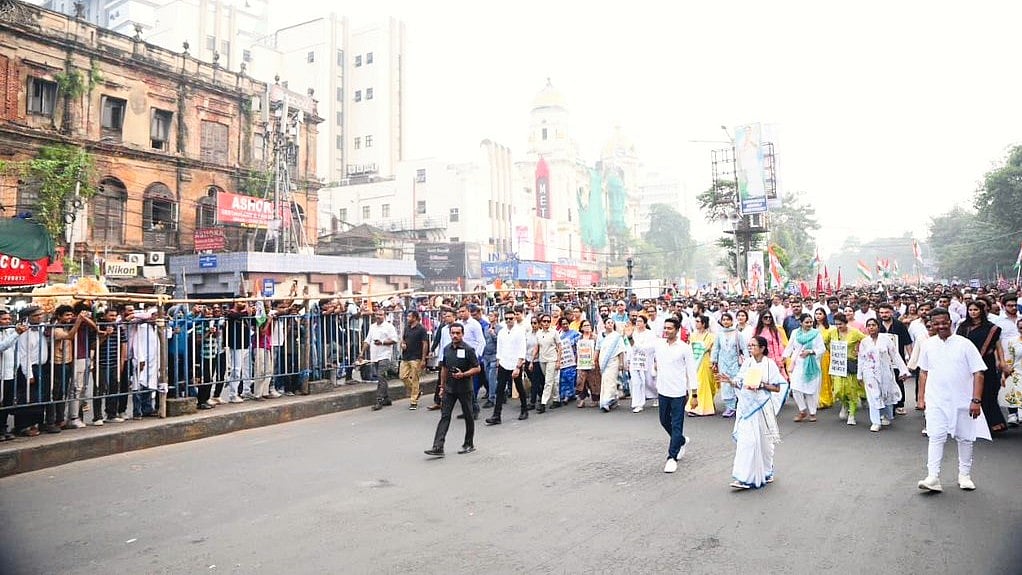POLITICS
West Bengal: As Mamata leads protest rally, technical glitch mars start of SIR
Mounting pressure on overworked teachers also marred the launch of Bengal’s ambitious SIR exercise

The Special Intensive Revision (SIR) of electoral rolls in West Bengal began on Tuesday amid both technical hurdles and complaints of excessive workload from schoolteachers pressed into election duty.
Simultaneously, chief minister Mamata Banerjee hit the streets of Kolkata, leading a protest rally against the SIR. Banerjee’s party, the ruling Trinamool Congress (TMC), has dubbed the exercise “silent invisible rigging” by the BJP-led Centre and the Election Commission of India.
Accompanied by her nephew and TMC national general-secretary Abhishek Banerjee, the CM began the 3.8-km rally from the statue of B.R. Ambedkar on Red Road, to culminate at Jorasanko Thakur Bari, the ancestral home of Rabindranath Tagore.
Thousands of TMC supporters thronged the rally route, waving the party flags, raising slogans and holding aloft colourful posters. Dressed in her trademark white cotton saree and slippers, Banerjee led the procession, occasionally stopping to greet people standing on balconies and pavements. Abhishek followed the chief minister, waving to the crowd, flanked by senior TMC leaders and ministers.
The state-wide exercise, being conducted after a 23-year gap, marks one of the ECI's most ambitious voter verification drives ahead of the 2026 Assembly polls. Over 80,000 booth-level officers (BLOs) have been deployed to carry out door-to-door enumeration across 294 Assembly segments, distributing forms and verifying voter details.
However, the rollout on the first day was anything but seamless. A technical glitch paralysed the ECI’s voter portal, delaying the planned online distribution of forms. “It is due to a technical problem. We hope the service will be activated within a few days,” an official from the Chief Electoral Officer’s (CEO) office told PTI, though he declined to give a specific timeline.
Published: undefined
Officials described the malfunction as a “backend failure” that prevented the system from going live on Tuesday morning. “Despite the setback, both online and offline processes will stabilise in the coming days,” another senior ECI official said, adding that the revision was “West Bengal’s most comprehensive voter list update in over two decades.”
While technical teams scrambled to fix the software issues, on the ground, hundreds of schoolteachers engaged as BLOs found themselves struggling to juggle classroom duties and election responsibilities. Many were unable to participate in the enumeration on the first day as they were required to report for regular teaching hours.
“Many teachers could not join the house-to-house process since they were on duty at school. Those whose schools are close to the distribution centres are somehow managing both,” said Golam Mustafa Sarkar, an office-bearer of the West Bengal Teachers’ Association.
The association has demanded that teachers be granted “on-duty” status during the SIR period to relieve them from simultaneous academic and administrative work. “Without on-duty status, teachers are being forced to handle both academic and election-related work simultaneously,” Sarkar said, calling the arrangement “an inhuman workload”.
He also raised safety concerns, noting that some teachers may have to travel to distant or poorly lit areas after school hours to complete enumeration duties.
A teacher from Murshidabad said he was unable to participate on Tuesday but planned to “make up for it on the next public holiday”. Several BLOs additionally complained that they had not yet received the official mobile phones assigned for digital data entry.
Published: undefined
The SIR, last conducted in 2002, has already become politically charged. While the BJP has hailed it as a move towards “greater transparency”, the TMC has questioned its timing and motives, accusing the ECI of acting under pressure from the Centre and BJP to manipulate voter lists ahead of next year’s Assembly elections.
“Altogether, 80,681 BLOs have been deployed to conduct the exercise across the 294 assembly seats. Around 7.66 crore enumeration forms have been prepared, and each voter will receive two copies — one to retain with a stamped acknowledgment and one for Election Commission records,” a senior ECI official said.
The first day passed largely peacefully, officials added, with no untoward incident reported. “We are hopeful that the process will proceed smoothly across the state,” the ECI representative noted.
To assist voters, SIR help desks have been set up at District Election Offices (DEOs) across the state. Major political parties — including the TMC, BJP, and CPI(M) — have opened their own voter assistance counters to help citizens fill and verify forms.
Political analysts view the revision as a crucial pre-election groundwork, with both ruling and opposition parties intent on ensuring their supporters’ names remain on the rolls. With the exercise forming the administrative bedrock for the 2026 polls, neither side is leaving anything to chance.
According to the ECI’s schedule, draft rolls will be published on 9 December, followed by a claims and objections period from 9 December to 8 January. Hearings and verifications will continue up to 31 January, and the final electoral rolls will be published on 7 February — just two months before the state heads to the polls, expected in April–May 2026.
With PTI inputs
Published: undefined
Follow us on: Facebook, Twitter, Google News, Instagram
Join our official telegram channel (@nationalherald) and stay updated with the latest headlines
Published: undefined